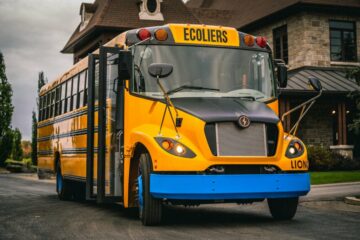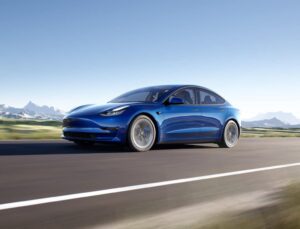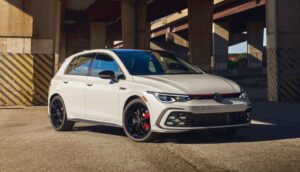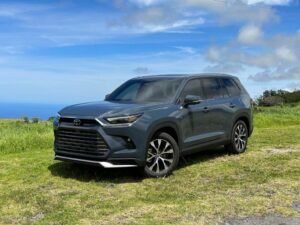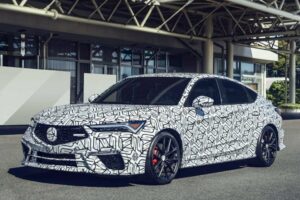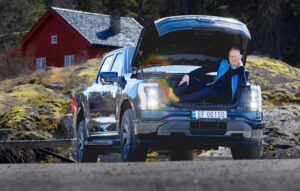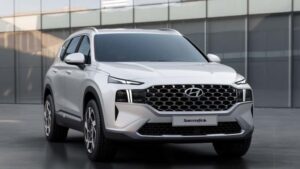Mercedes-Benz will launch an all-new version of its Sprinter van later this year, and you might think of it as the beginning of the end.

The Sprinter has been a critical offering for the German automaker, especially in the U.S. where it has doubled its share of the van market during the last five years. But the familiar, gas-powered version of the van comes at a time when Mercedes is preparing to make a major transition.
By 2026, it will debut a line-up of new, all-electric models — and begin phasing out vans running on internal combustion engines, Mathias Geisen, head of Mercedes-Benz Vans, said during a media webinar outlining the company’s strategy.
VAN.EA
“Starting (in) 2026, we will introduce our purpose-built EV architecture VAN.EA,” Geisen explained. “This enables us to consolidate our midsize and large vans down to only one architecture and significantly reduce the complexity of our product portfolio.”
Mercedes already produces an all-electric version of the Sprinter van, but the eSprinter is a compromise design based on the conventional, gas-powered model. Future all-electric models using the VAN.EA platform will offer numerous advantages for customers, he promised during the media webinar, including better range. By moving the battery pack and motors below the load floor, the all-electric vans will be able to deliver increased cargo space, as well.
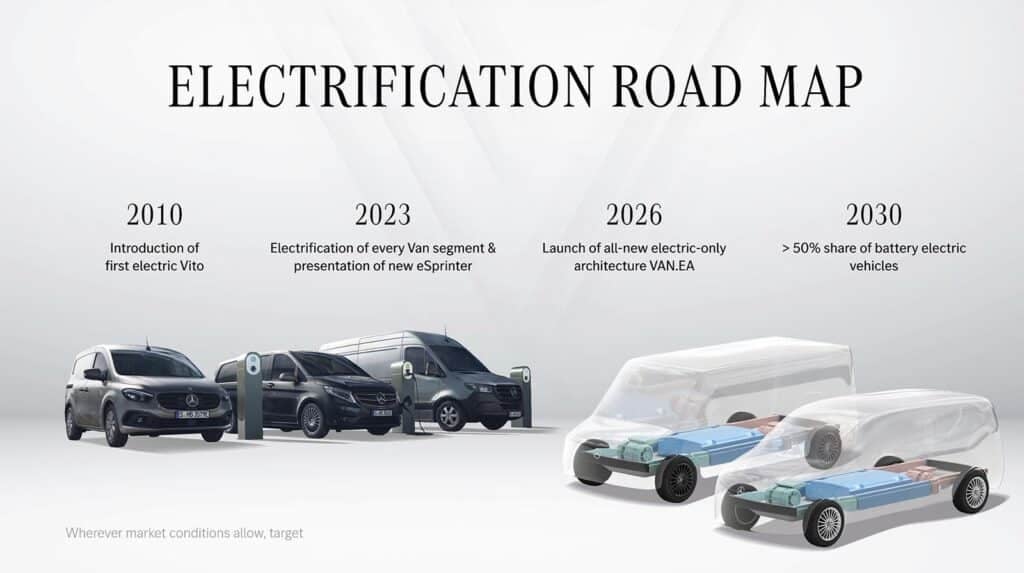
Improving EV economics
VAN.EA also will offer advantages for Mercedes, said Geisen. Right now, the automaker’s van operations are “highly profitable,” he noted, yielding a 15% return on sales last year. But current electric models “are less profitable than (those using) combustion engines.”
The automaker expects to narrow, and possibly close, that gap with the VAN.EA architecture, since it will be able to share that platform with a broad array of future midsize to full-size vans.
“We intend to keep a strong financial position when it comes to electrification,” said Geisen, noting the plan is to reduce fixed costs with VAN.EA by 20%.
An all-electric van will target the U.S.
Among the products based on the VAN.EA architecture now under development, Mercedes plans to debut a van specifically designed for the U.S. market, where its share is now a solid 16%, said the CEO.
It’s codenamed VAN-EA-P, a statement from Mercedes noting this “stands for privately positioned vans in the midsize segment with a new level of luxury. Whether for lifestyle-oriented customers with the highest standards, as a VIP shuttle, as a locally carbon-emissions free mobile office or for leisure-active families.”

A version of the new platform, referred to as VAN.EA-C, will be developed for commercial buyers and will be offered in midsize and large formats.
“With its modular and scalable design, the architecture is tailored for different configurations and upfitter solutions: From Courier, Express and Parcel delivery (Last-Mile Delivery) vehicles to ambulances or eGrocery vans, from municipal vans or box upfits to lifting platforms or recreational vehicles (RV), almost everything is conceivable,” the automaker explained.
Multiple production sites
At launch, VAN.EA products will roll out of a new Mercedes van plant in Jawor, Poland.
It’s widely expected that the private van, along with other electrified Mercedes vans, also will be produced at the company’s big plant outside Charleston, South Carolina.
“Of course, we’re looking at that,” said Geisen. Though he declined to confirm if — or when — that will happen, he made it clear that is the likely direction.

“We see a huge potential in the U.S. (van market) we can participate in,” he added. “The more vehicles we can get out of Charleston, the better that is.”
Phasing out internal combustion power
As to how current and potential customers might accept the shift to electric propulsion, Geisen said it depends upon which segment one is focusing on. Electrified products are in high demand with last-mile delivery services, he noted, though the reception is mixed in other van segments.
While the first VAN.EA products will debut in 2026, Mercedes plans to continue producing some of its existing models, such as the gas- and diesel-powered Sprinter, for some time going forward. The executive did not lay out a timeline for when products using internal combustion engines will be completely phased out.
But Mercedes clearly has big aspirations. “Our target of more than 50% BEV share by 2030 goes hand in hand with a significant reduction in carbon-emissions across the entire lifecycle of new vans,” Andreas Zygan, head of Mercedes-Benz Vans Development, said in a statement.
- SEO Powered Content & PR Distribution. Get Amplified Today.
- PlatoAiStream. Web3 Data Intelligence. Knowledge Amplified. Access Here.
- Minting the Future w Adryenn Ashley. Access Here.
- Buy and Sell Shares in PRE-IPO Companies with PREIPO®. Access Here.
- Source: https://www.thedetroitbureau.com/2023/05/mercedes-benz-vans-sets-course-for-an-all-electric-future/
- :has
- :is
- :not
- :where
- 15%
- 2026
- 2030
- a
- Able
- Accept
- across
- added
- advantages
- all-electric
- along
- already
- also
- Ambulances
- an
- and
- architecture
- ARE
- Array
- AS
- At
- based
- battery
- BE
- been
- begin
- Beginning
- below
- Better
- Big
- Box
- broad
- Bureau
- but
- buyers
- by
- CAN
- Can Get
- Cargo
- ceo
- chief
- clear
- clearly
- Close
- comes
- commercial
- company
- Company’s
- completely
- complexity
- compromise
- Confirm
- consolidate
- continue
- conventional
- Costs
- course
- critical
- Current
- Customers
- debut
- deliver
- delivery
- Delivery Services
- Demand
- depends
- Design
- designed
- developed
- Development
- DID
- different
- direction
- doubled
- down
- during
- EA
- Electric
- enables
- end
- Engines
- Entire
- especially
- EV
- everything
- executive
- existing
- expected
- expects
- explained
- express
- familiar
- families
- financial
- First
- fixed
- Floor
- focusing
- For
- Forward
- Free
- from
- future
- gap
- German
- get
- Goes
- going
- hand
- happen
- he
- head
- High
- highest
- How
- HTTPS
- huge
- if
- in
- In other
- Including
- increased
- intend
- internal
- introduce
- IT
- ITS
- jpg
- Keep
- large
- Last
- Last Year
- later
- launch
- less
- Level
- lifecycle
- lifting
- likely
- load
- locally
- looking
- Luxury
- made
- major
- make
- map
- Market
- max-width
- Media
- might
- mixed
- Mobile
- model
- models
- modular
- more
- Motors
- moving
- municipal
- New
- New Platform
- noted
- now
- numerous
- of
- offer
- offered
- offering
- Office
- on
- ONE
- only
- Operations
- or
- Other
- our
- out
- outside
- Pack
- participate
- Phased
- plan
- plans
- platform
- Platforms
- plato
- Plato Data Intelligence
- PlatoData
- Poland
- portfolio
- position
- positioned
- possibly
- potential
- potential customers
- preparing
- private
- Product
- Production
- Products
- profitable
- promised
- propulsion
- range
- reception
- Recreational
- reduce
- reduction
- referred
- return
- right
- road
- Roll
- running
- s
- Said
- sales
- says
- scalable
- see
- segment
- segments
- Services
- Sets
- Share
- shift
- significant
- significantly
- since
- solid
- Solutions
- some
- South
- South carolina
- Space
- specifically
- standards
- Statement
- Strategy
- strong
- such
- tailored
- Target
- than
- that
- The
- think
- this
- this year
- those
- though?
- time
- timeline
- to
- transition
- u.s.
- under
- upon
- us
- using
- Vehicles
- version
- VIP
- we
- webinar
- WELL
- when
- whether
- which
- widely
- will
- with
- year
- years
- yielding
- you
- zephyrnet

